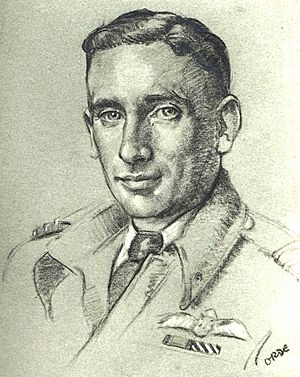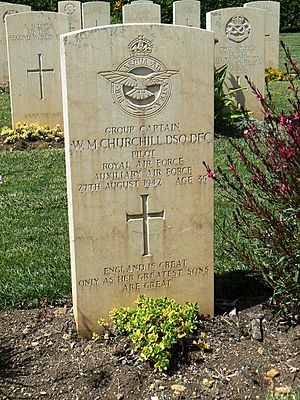Walter Churchill facts for kids
Quick facts for kids
Walter Myers Churchill
|
|
|---|---|

Portrait of Squadron Leader Walter Churchill DSO DFC by Cuthbert Orde
|
|
| Born | 24 November 1907 Amsterdam, Netherlands |
| Died | 27 August 1942 (aged 34) Sicily, Italy |
| Buried |
Syracuse War Cemetery, Sicily
|
| Allegiance | United Kingdom |
| Service/ |
Royal Air Force |
| Years of service | 1932–1942 |
| Rank | Group captain |
| Service number | 90241 |
| Commands held | RAF Valley (1942) No. 71 Squadron (1940–41) No. 605 Squadron (1940) No. 3 Squadron (1940) |
| Battles/wars | World War II |
| Awards | Distinguished Service Order Distinguished Flying Cross |
Walter Myers Churchill was a brave pilot in the Royal Air Force (RAF) during World War II. He was born on November 24, 1907, and sadly passed away on August 27, 1942. He was known as a "flying ace" because he shot down many enemy planes.
Walter Churchill was also the older brother of Peter Churchill and Oliver Churchill. Both of his brothers worked for the Special Operations Executive during the war. This was a secret British organization.
Contents
Early Life and Education
Walter Churchill was born in Amsterdam, Netherlands. His father, William Algernon Churchill, was a British diplomat. This meant his family moved around a lot. His mother, Violet Churchill, was a singer.
Walter's uncle, Walter Myers, was a famous doctor. Walter was named after him. Walter went to Sedbergh School and later studied languages at King's College, Cambridge.
From Engineering to Aviation
After college, Walter became an engineer. He worked for a company called Armstrong Siddeley Motors. Later, he started his own company, Churchill Components. They made parts for airplane engines.
His company even worked with Sir Frank Whittle. Sir Frank Whittle was a pioneer in jet engine technology. Walter's company helped make parts for early jet engines.
Joining the Royal Air Force
Walter Churchill joined the Auxiliary Air Force in 1932. He became a pilot officer in No. 605 (County of Warwick) Squadron. He quickly moved up in rank.
In 1939, he was called back to full-time service. He became the commander of No. 605 Squadron. He also served with No. 3 Squadron and No. 71 (Eagle) Squadron.
Fighting in the Battle of Britain
Walter Churchill was a squadron leader during the Battle of Britain. This was a very important air battle. On September 11, 1940, his Hurricane plane was badly damaged. This happened during a fight over Maidstone. Luckily, he managed to land safely, even though he was slightly hurt.
He was known for being a clever leader. When his squadron had outdated planes, he found a way to get them replaced. He told his pilots to land the planes in a way that caused minor damage. This helped them get newer, better Hurricanes.
A Flying Ace and Hero
Walter Churchill was an amazing pilot. He was credited with shooting down seven enemy aircraft. This made him a "flying ace." For his bravery and skill, he received two important awards: the Distinguished Service Order (DSO) and the Distinguished Flying Cross (DFC).
He also helped the RAF by testing different fighter planes. He played a big part in getting Spitfire planes to help defend Malta. Malta was under attack during the war.
Final Mission and Legacy
In August 1942, Walter Churchill was sent to command RAF Ta Kali in Malta. He planned attacks on enemy airfields in Sicily. On August 23, he led the first raid.
Just four days later, on August 27, he led another raid. This time, he was attacking an airfield near Gela in southern Sicily. His Spitfire plane was hit by anti-aircraft fire (flak). The plane crashed, and Walter was killed.
He was buried at the Syracuse War Cemetery in Sicily.
Air Vice Marshal Keith Park wrote a letter to Walter's wife. He said that Walter's "fine example and inspired leadership will live on in Malta." He also said that Walter was an "inspiration to the fighter squadron."
Walter's company, Churchill Components, continued after his death. His wife, Joyce, and later his son, James, managed it. Today, the company is called JJ Churchill Ltd.. It is managed by James's son, Andrew.
Awards and Recognition
Walter Myers Churchill received several honors for his service:
- Distinguished Flying Cross (DFC)
* Awarded on May 31, 1940.
*
This officer has shot down three enemy aircraft since his arrival in France and has led many patrols with courage and skill.
– The London Gazette
- Distinguished Service Order (DSO)
* Awarded on May 31, 1940.
*
This officer assumed command of a squadron shortly after its arrival in France and led it with marked success, inspiring his pilots and maintenance crews magnificently. He undertook the tactical instruction of new pilots, led many patrols successfully and organised his ground defences and crews in an exemplary manner. While under his command the squadron destroyed 62 enemy aircraft and he was throughout the main-spring of the offensive spirit, their excellent tactics and their adequate maintenance results. Only four pilots of the squadron were lost. Flight Lieutenant Churchill has recently destroyed four enemy aircraft, bringing his total to seven.
– The London Gazette


